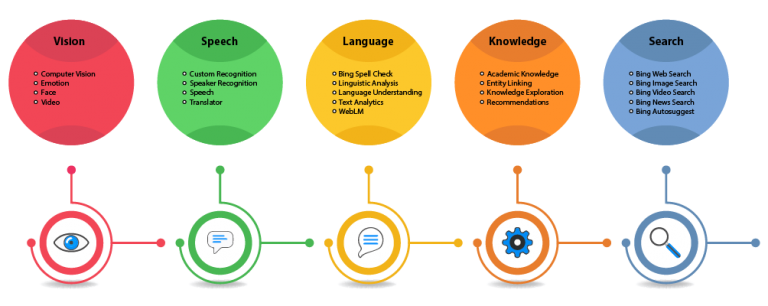Introduction to Azure Cognitive Services
What are Azure Cognitive Services?
- Azure Cognitive Services are APIs, SDKs and services to build AI application without having detail knowledge on AI and data science.
Azure Cognitive Services are divided in to following five categories
- Vision
- Speech
- Language
- Search
- Knowledge

It has almost 22 sets of different APIs.
Vision APIs
-
Computer Vision: Sets of API which allow you to access advanced algorithms for image processing and getting information.
-
Custom Vision: Its allows you to build custom image classifier. You can access information through API.
-
Content Moderator: Content Moderator provides monitoring for possible offensive, undesirable, and risky content.
-
Face API: Allow you to access advanced algorithm to detect and recognize face.
-
Emotion API: Take picture as an input, detect its emotion and return output. For example: percentage of happiness, angry etc.
-
Video Indexer: Extract inner content of the video.
Speech APIs
-
Speech Service: Speech Service adds speech-enabled features to applications.
-
Custom Speech Service: Using custom speech service, you can create your own acoustic model and use it to your application.
-
Bing Speech API: You can easily apply speech-enabled feature to your application. For example : Speech to text and text to speech.
-
Translator Speech: You can translate real time speech and its output will be text.
-
Speaker Recognition API: Speaker recognition API helps you to identify specific speaker.
Language API
- Bing Spell check: API to use spell and grammar checking.
- Language Understanding Intelligence Service (LUIS): Natural language processing engine to understand query.
- Linguistic Analysis: Natural language processing tool to understand sentence structure.
- Text Analytics: Natural language processing tool to analyze sentiment, key phrase extraction and language detection.
- Translator Text: Translator text translate text in real-time.
- Web Language Model: It’s a natural language processing tool for anticipating word sequencing, completions, and word breaking of strings without any spaces
Search API
- Bing News Search: Returns news based on the query of the user.
- Bing Video Search: Returns list of videos based on the query of the user.
- Bing Web Search: Returns list of results based on the query of the user.
- Bing Autosuggest: Returns list of suggested search query based on the query of the user.
- Bing Custom Search: Bing Custom Search allows you to create tailored search experiences for topics that you care about.
- Bing Entity Search: Bing Entity Search returns information about entities that Bing determines are relevant to a user’s query.
- Bing Image Search: Returns list of images based on the user’s query.
- Bing Visual Search: Bing Visual Search provides returns insights about an image such as visually similar images, shopping sources for products found in the image, and related searches.
Knowledge API
- Custom Decision Service: Custom Decision Service helps you create intelligent systems with contextual decision making for personalizing and optimizing user experience.
- QnA Maker: You can create custom and static question and answer service using this service.
